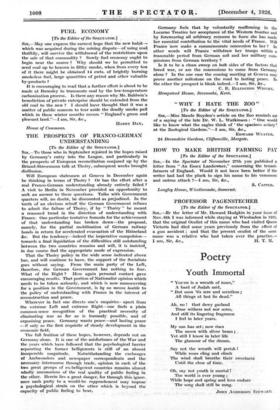THE PROSPECTS OF FRANCO-GERMAN UNDERSTANDING
[To the Editor of the SPECTATOR.] SIR,—To those who in September rejoiced in the hopes raised by Germany's entry into the League, and particularly in the prospects of European reconciliation conjured up by the Briand-Stresemann talk at Thoiry, subsequent weeks brought disillusion.
Will European statesmen at' Geneva in December again be thinking in terms of Thoiry ? Or has the effort after a real Franco-German understanding already entirely failed.? A visit to Berlin in November provided an opportunity to seek an answer -to these questions. Talks with Government quarters will, no doubt, be discounted as prejudiced. In the teeth of an obvious rebuff the German Government refuses to admit the failure of Thoiry, if by " Thoiry " be meant a reasoned trend in the direction of understanding with France. One particular tentative formula for the achievement of that understanding has broken down—the proposal, namely, for the partial mobilization of German railway bonds in return for accelerated evacuation of the Rhineland &c. But the tendency—indeed the imperative compulsion— towards a final liquidation of the difficulties still outstanding between the two countries remains and will, it is insisted, in due course find the appropriate mode of expression.
That the Thoiry policy in the wide sense indicated above has, and will continue to have, the support of the Socialists goes without saying. From the main party of the Left, therefore, the German Government has nothing to fear. What of the Right ? Here again personal contact gave encouraging results. That portion of Nationalist opinion which, needs to be taken seriously, and which is now manoeuvring_ for a position in the Government, is by no means hostile to the policy of undeistanding with France in the interest of reconstruction and peace.
Wherever in fact one directs one's enquiries—apart from the extreme Left and extreme Right—one finds a plain common-sense recognition of the practical necessity of eliminating war as far as is humanly possible, and of organizing peace. Germany wants peace—and 'lasting peace —if only as the first requisite of steady 'development in the economic field.
The full fruition of these hopes, however, depends not on Germany alone. It is one of the .misfortunes of the War and the years which have followed that the psychological barrier separating the former belligerents is still of an almost insuperable magnitude. Notwithstanding the exchanges of Ambassadors and newspaper correspondents and the- necessary intercourse through trade, opinion in each of the two great groups of ex-belligerent countries remains almost wholly unconscious of the real quality of public feeling in the other. Herein lies a great danger, for through this ignor- ance each party to a would-be rapprochement may impose- s psychological strain on the other which is beyond the capacity of public feeling to bear. Germany feels that by voluntarily reaffirming in the Locarno Treaties her acceptance of-the Western frontier and by forswearing all arbitrary recourse to force she has made her essential contribution to the vital needs of France. Mt France "now make a commensurate concession to her ? In other words will FrsinCe withdraw her troops within a reasonable period from German soil and her military cam. missions from German territory ?
Is it to be a clean sweep on both sides of the factors that breed war, or are the concessions to come from Germany alone ? In the one case the coming meeting at Geneva may prove another milestone on the road to lasting peace. in the other the prospect is bleak indeed.—I am, Sir, &c.,






























































 Previous page
Previous page